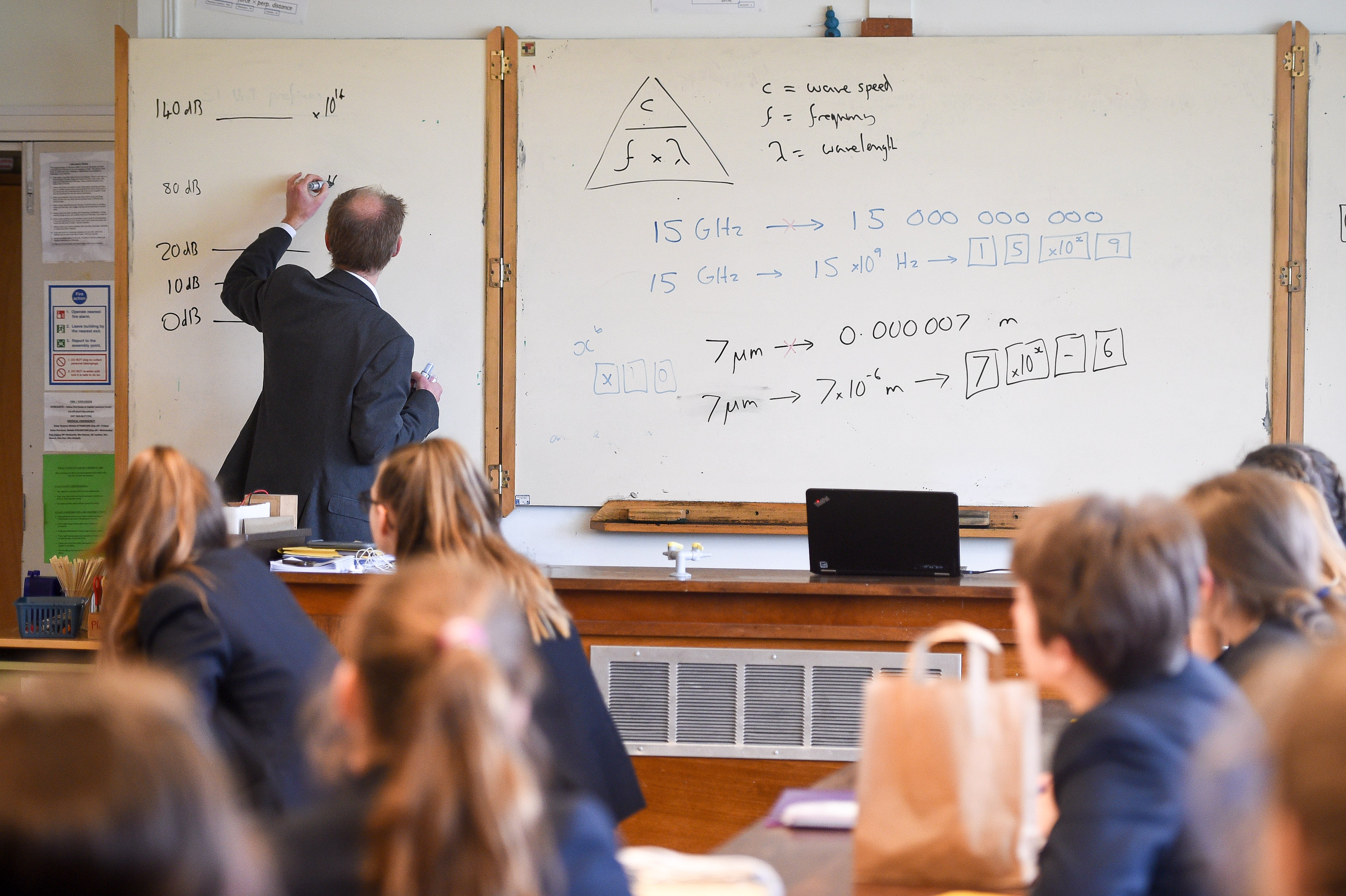Labour call for action on teacher recruitment ‘crisis’
The party says more needs to be done over a lack of science and maths teachers with ‘acute’ shortages seen in physics.

Your support helps us to tell the story
From reproductive rights to climate change to Big Tech, The Independent is on the ground when the story is developing. Whether it's investigating the financials of Elon Musk's pro-Trump PAC or producing our latest documentary, 'The A Word', which shines a light on the American women fighting for reproductive rights, we know how important it is to parse out the facts from the messaging.
At such a critical moment in US history, we need reporters on the ground. Your donation allows us to keep sending journalists to speak to both sides of the story.
The Independent is trusted by Americans across the entire political spectrum. And unlike many other quality news outlets, we choose not to lock Americans out of our reporting and analysis with paywalls. We believe quality journalism should be available to everyone, paid for by those who can afford it.
Your support makes all the difference.Teacher recruitment is falling behind demand for key science and maths subjects, Labour has warned, as the party called for action to prevent a post-pandemic vacancies crisis.
Analysis of Government data by the party revealed that while more pupils than ever are taking STEM subjects at GCSE, under a third of trainee teachers have been recruited for these subjects.
The party said shortages were “particularly acute” in physics, with just one in eight target training places filled.
Two years of pandemic chaos, unsustainable workloads and pressure from government is sapping the passion that drives people to the profession
In computing, fewer than a quarter of places had been filled.
Shadow schools minister Stephen Morgan told the Confederation of School Trusts annual conference that the Government was creating a “crisis” in the teaching profession as he set out Labour’s plans to boost recruitment.
He said the Government had “created a crisis in teaching, draining talent from our schools and limiting children’s learning and development”.
“Two years of pandemic chaos, unsustainable workloads and pressure from government is sapping the passion that drives people to the profession.
“Children should be able to pursue the opportunities they choose. Labour would put 6,500 new teachers in classrooms across the country and back them with the training and support they need to deliver excellence in every school.”
Labour highlighted that teacher vacancies had tripled since a decade ago with more than 1,500 full-time positions going unfilled, while the number of teachers leaving the profession after a year had increased to more than one in ten.
Nearly a third quit the profession after five years.
Labour said that for physics, just 25 people had been recruited for the 2022-23 target of 2,610 trainees, while only 8 had been recruited for computing out of a target of 1,145.
Mr Morgan praised trusts for working at “the centre of their communities” and said that this resonated with Labour’s history of establishing Sure Start centres.
He told Steve Rollett, CST deputy chief executive, that “we’re not in the business of disrupting academies”.
He described the Schools White Paper as “hollow” and “gimmicky”, and that the Schools Bill “fails to match the ambition we need to see for our children”.
He added: “I’ve no doubt that – like me – you will have concerns about the sweeping powers the Bill proposes for the Secretary of State.
“Powers to set the length of your school day. Powers around the exams children are entered for. Powers to say not just what you teach children, but how you teach them.
“Powers that seem to run counter to the very notion of independence and innovation ministers tell us academies should have,” he said.
Nadhim Zahawi told the conference on Thursday that he did not intend to “impose any new burdens that would restrict the very freedoms that enable you to be such a success” via the Schools Bill.
Mr Morgan said there had been “too much needless micro-managing of the sector from Whitehall in recent years”.
There have been concerns raised in the House of Lords by former academies ministers such as Lord Nash over Clause 1 of the Schools Bill and whether this would mean the Government had too much centralised power over academy trusts.
Labour said its National Excellence Programme (NEP) was “the most ambitious school improvement programme in a generation, with measures to tackle the day-to-day challenges teachers face and help every child succeed and thrive”.
The NEP aims to recruit thousands of new teachers to address teaching vacancies.
A Department for Education spokesperson said: “The analysis in this release is misleading, as the figures compare an end-of-year target with a mid-year snapshot.
“The number of teachers in the system remains high and there are now more than 465,000 teachers working in state-funded schools across the country, which is 24,000 more than in 2010.
“Our bursaries and scholarships worth between £24,000 and £26,000 tax-free are helping to encourage talented trainees to key subjects such as chemistry, computing, mathematics and physics. We also continue to work on delivering pay increases and pay awards for new and experienced teachers.”